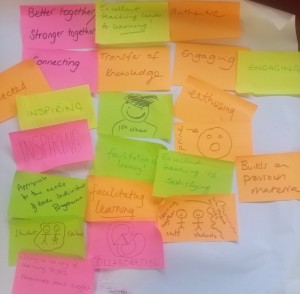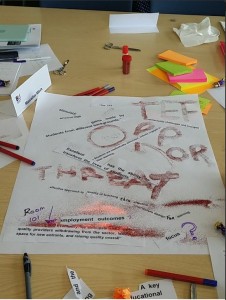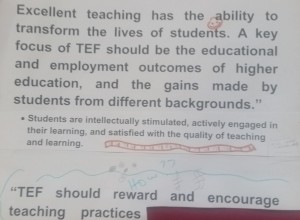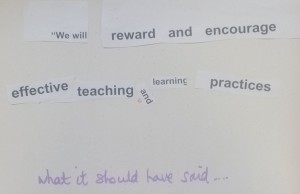On the day that the Higher Education White Paper, Success as a Knowledge Economy, is released we thought we would share with you our thoughts from the Teaching Excellence Framework workshop we facilitated as part of the CEL away day.
This workshop aimed to raise awareness among CEL staff regarding the implications of the Green Paper (Fulfilling our potential: Teaching Excellence, Social Mobility and Student Choice) and the Teaching Excellence Framework (TEF) for their individual work and career development, as well as for the future of CEL in the medium and long term. Through a series of participatory activities, we collectively de-constructed the discourse and main points of the TEF, working on our definitions of teaching excellence vis-à-vis the indicators outlined in the Green Paper.
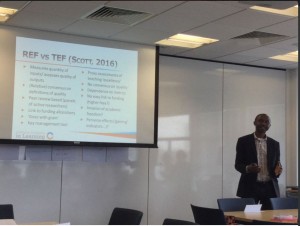
During the presentation, the two slides that generated the most conversation and debate were, first, the Green paper facts gathered by the National Union of Students which showed what kind of discourse Higher Education is moving into. The slide with a comparison between the TEF and the most recent Research Excellence Framework (Scott, 2016) also generated attention, mainly due to the disparities between the two, even in the presence of parallels.
In addition, we outlined some of the proposed metrics that could be used to measure what constitutes teaching excellence. Whilst the Green Paper recognises that these are largely proxies rather than direct measures of the quality of teaching, they may be used in addition to other measures for evaluating the quality of teaching and learning that goes on in universities.
A simplistic approach to judging the quality of teaching drawn on the rate of graduate employability or student retention can be problematic and requires further probing. Furthermore, some of the existing controversies surrounding the National Student Survey may generate even more anxieties.
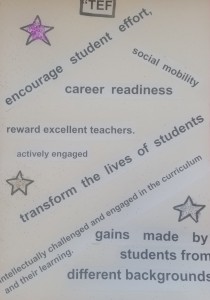
The responses to the Green Paper captured the need for more institutional and qualitative evidence to balance any potential shortcoming of these metrics. Although the White Paper emphasises a slower phasing in of a framework for increasing tuition fees based on measures of teaching excellence, institutions and the sector are going to have to provide evidence of what ‘excellence’ in teaching and learning means.
We approached some of these issues (how we understand excellence in teaching, what the Teaching Excellence Framework means to us, and where learning fits in with all of this) creatively to explore how we all felt about them.
The proposed changes to higher education in England, including those relating to teaching and learning, are policies lived and felt by all those working within HE. So that we could have a deeper and more collective engagement with the Green Paper, we created a “Public Feelings” space in which participants had the opportunity to explore their feelings through art-based working.
An extract from Ann Cvetkovich’s book, Depression: a public feeling was read out to frame a session in which feelings – bad, fraught, frustrated feelings, as well as feelings of hope – inform, and perform, our responses to political discourse. Working with feelings in this way recognises that “not only are already political but [transform] our understanding of what counts as political” (Cvetkovich, 2012: 110).
As one of the facilitors wrote:
“My involvement in the process of preparing and presenting on the TEF was also very profitable as I became more acquainted with the intricacies within the Green Paper. I also realised that in the course of the presentation, participants were astonished with some of the revelations from the TEF such as the number of times some subjects were mentioned in the Green Paper which suggests the underpinning driving force”.
What became apparent through the cutting and collaging is that excellent teaching is something that connects – people, ideas, skills, knowledges, times, places. What else emerged is that there remains some anxiety that the focus on value for money that appears so central to policy, could risk the values-based teaching and learning praxis that is at the heart of the matter for many of us working in HE.
Thank you to all those who took part!
